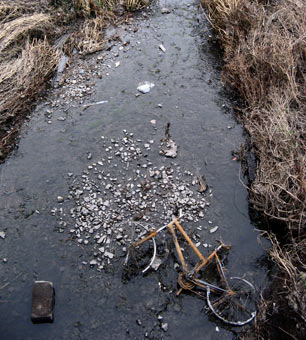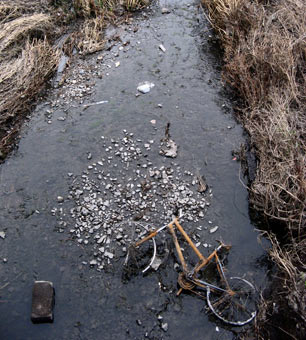Honest, paywall-free news is rare. Please support our boldly independent journalism with a donation of any size.
 (Photo: Deron Staffen / Flickr)The majority of the rivers and streams in America are in “poor” or “fair” condition due to pollution and other factors, according to a national survey released Tuesday by the US Environmental Protection Agency.
(Photo: Deron Staffen / Flickr)The majority of the rivers and streams in America are in “poor” or “fair” condition due to pollution and other factors, according to a national survey released Tuesday by the US Environmental Protection Agency.
During the summers of 2008 and 2009, researchers sampled 1,924 river and streams across the country ranging from large rivers in urban areas to small rural streams. The survey found that 55 percent of rivers and streams do not support healthy levels of aquatic life, due largely to nitrogen and phosphorus pollution as well as habitat destruction.
“The health of our nation’s rivers, lakes, bays and coastal waters depends on the vast network of streams where they begin, and this new science shows that America’s streams and rivers are under significant pressure,” said Nancy Stoner, assistant administrator of the EPA Office of Water.
Only 21 percent of rivers and streams sampled were in “good condition,” and 23 percent were in “fair condition,” according to the survey.
High Levels of Pollution
Fertilizers in runoff from agricultural areas and streets in urban areas, and air pollution from burning fossil fuels contribute to nitrogen and phosphorus contamination in streams and rivers. Across the nation, 40 percent of rivers and streams have high nitrogen levels, and 28 percent have high levels of phosphorus, according to the EPA.
The EPA also found that 13,114 miles of river have fish that may be unsafe to eat due to high mercury levels in their flesh.
A similar EPA survey study found nearly 50 percent of lakes across the country contain fish with levels of mercury that exceed safety limits for human consumption.
For most people, the health risk of mercury from eating fish is not a concern unless they regularly eat fish from contaminated waters, but mercury can harm unborn and young children. Mercury occurs naturally but is also produced as a pollutant by coal-burning power plants and other industries.
A Threat to Health and Recreation
High levels of bacteria were found in 9 percent of streams or rivers, making those bodies of water potentially unsafe for swimming and recreation.
“[The report] highlights that there is a continuing and in fact growing problem in the way we treat the waters we depend on,” said Noah Garrison, a water expert with the National Resources Defense Council.
Garrison told Truthout that Americans depend on rivers and streams for recreation and to support fisheries, and the report highlights an “absolute need” to protect these resources.
“When we don’t take care of them, we see results like flooding and other issues that come up,” Garrison said.
Garrison said that the EPA is expected to update its regulations for storm water runoff this summer for the first time in a decade. The EPA, he said, should incorporate green infrastructure and rainfall retention into the new rules to help reduce pollution flowing from urban areas and into streams.
A Regional Problem
The southern coastal plains of the southeastern states and the Mississippi River basin had the highest percentage of polluted waters, with 71 percent in poor condition and only 12 percent in good condition.
In southern Appalachia, 65 percent of rivers and streams are in poor condition. Fifty-seven percent of streams in Northern Appalachia, which spans from northern Ohio to Maine, are in poor condition, and 59 percent of streams in the northern Midwest are in poor condition.
River and stream health is highest in the northwestern states of Washington, Oregon, Idaho and Montana, where 42 percent of streams are in good condition and only 26 percent are in poor condition.
Press freedom is under attack
As Trump cracks down on political speech, independent media is increasingly necessary.
Truthout produces reporting you won’t see in the mainstream: journalism from the frontlines of global conflict, interviews with grassroots movement leaders, high-quality legal analysis and more.
Our work is possible thanks to reader support. Help Truthout catalyze change and social justice — make a tax-deductible monthly or one-time donation today.
